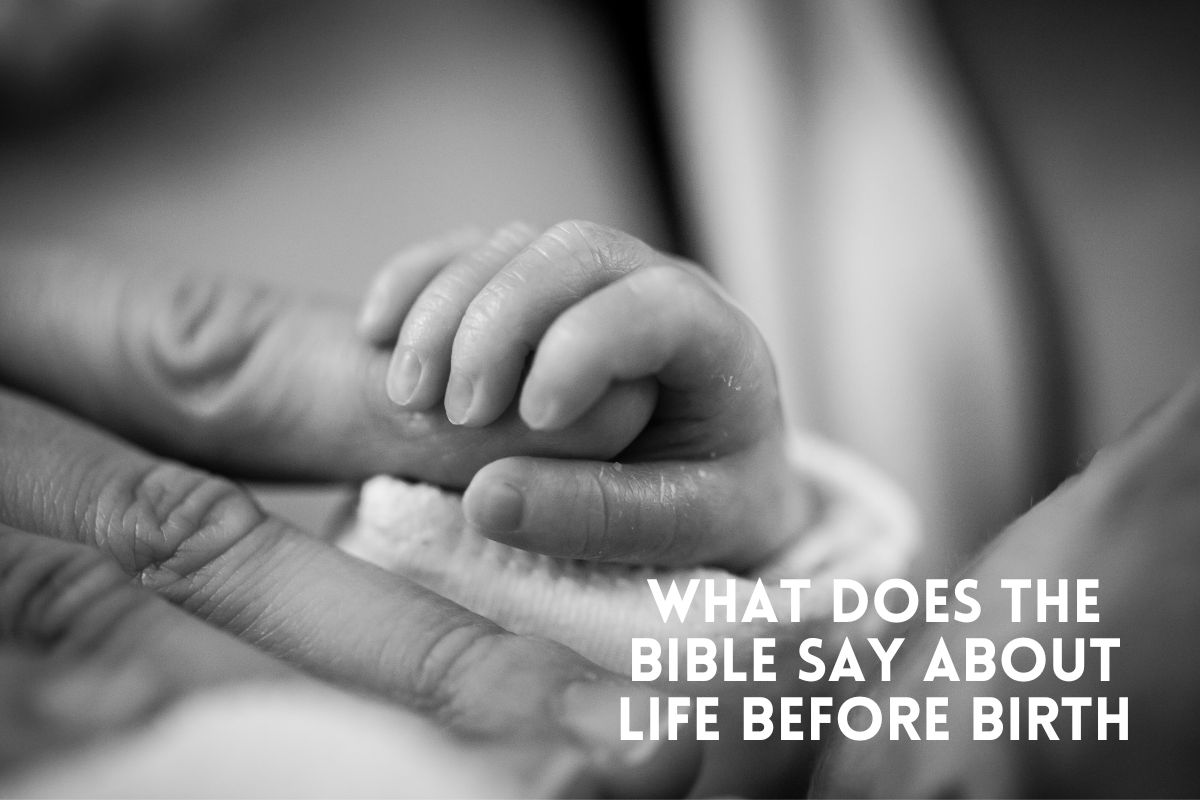The question of personal existence before birth is one that has captivated the minds of philosophers, theologians, and individuals seeking to understand the nature of human life. While the Bible provides valuable insights into the creation of life, the concept of pre-existence before birth is not explicitly addressed.
Instead, the focus is often on the sanctity of life, the purpose and plans of God, and the inherent value of each individual. This exploration aims to delve into the biblical perspective on the question of personal existence before birth and shed light on the insights it offers.
Importance of understanding the biblical perspective on life before birth
Understanding the biblical perspective on life before birth is crucial for individuals seeking guidance on ethical issues, such as abortion, reproductive technologies, and the sanctity of life. The Bible is a significant religious text for millions of people around the world, and it provides insights into God’s design for human life. By exploring what the Bible says about life before birth, we can gain a deeper understanding of the value and significance of each individual from the moment of conception.
Overview of the different views and interpretations
When it comes to the topic of life before birth, there are various views and interpretations within Christian theology. These perspectives can differ in their understanding of when life begins, the nature of the unborn child, and the implications for moral decision-making.
- Traditional View: The traditional view holds that life begins at conception, and the unborn child possesses inherent value and dignity. This perspective emphasizes the sanctity of life and the responsibility to protect and care for the unborn.
- Delayed Ensoulment View: Some interpretations propose a delayed ensoulment view, suggesting that the unborn child does not receive a soul or personhood until a certain stage of development, such as quickening (when the mother first feels fetal movement) or viability (when the fetus is capable of surviving outside the womb).
- Gradual Development View: The gradual development view acknowledges the biological continuum of human development from conception to birth. It suggests that personhood gradually emerges and becomes fully realized over time, rather than being present from a specific moment.
- Personal Convictions: Individuals may hold personal convictions influenced by their cultural, religious, or philosophical beliefs. These convictions can shape their understanding of life before birth, which may vary across different faith traditions and personal interpretations of scripture.
Creation and the Imago Dei
A. God’s role as the Creator of life
The Bible affirms that God is the ultimate Creator of life. In Genesis 1:27, it states, “So God created mankind in his own image, in the image of God he created them; male and female he created them.” This verse highlights God’s active role in creating human beings. It emphasizes that human life is not a result of chance or mere biological processes, but a deliberate act of God’s creative power.
B. The concept of the Imago Dei (image of God)
The Imago Dei, meaning the image of God, is a fundamental theological concept found in the Bible. It signifies that human beings are uniquely created in the likeness and reflection of God. While the exact nature of the Imago Dei is debated among theologians, it generally encompasses qualities such as rationality, morality, spirituality, and relationality.
The Imago Dei implies that every individual, including those before birth, carries inherent worth and dignity. It is not limited to specific stages of human development or external characteristics but is a fundamental aspect of being human. As such, the Imago Dei provides a theological foundation for recognizing the value and sanctity of life before birth.
C. Implications for the value and sanctity of life before birth
The belief in the Imago Dei has significant implications for how we understand and regard life before birth. If human beings are created in God’s image, it follows that the unborn child, from the moment of conception, possesses inherent value and worth. This perspective rejects the notion that personhood or human dignity is contingent upon the stage of development, physical abilities, or the subjective judgments of others.
The concept of the Imago Dei challenges us to approach the unborn with reverence and respect, acknowledging their intrinsic worth. It compels us to consider the ethical implications of actions that might threaten or disregard the sanctity of life before birth, such as abortion or the destruction of embryos. It also calls us to promote compassionate care and support for expectant mothers and families facing the challenges of pregnancy.
Psalm 139:13-16 – Divine Knowledge and Formation
Examination of Psalm 139:13-16 and its relevance
Psalm 139:13-16 is a poetic passage that explores the depth of God’s knowledge and involvement in human life. It states, “For you created my inmost being; you knit me together in my mother’s womb. I praise you because I am fearfully and wonderfully made; your works are wonderful, I know that full well” (Psalm 139:13-14, NIV). This passage highlights the intimate connection between God and the unborn child, emphasizing God’s active role in their formation.
This verse is relevant in the context of understanding life before birth because it affirms that God’s knowledge and creative work extend to the earliest stages of human existence. It underscores the significance of the unborn child and reinforces the idea that life begins in the womb.
God’s intimate involvement in the formation of a person
Psalm 139:13-16 portrays God’s intimate involvement in the formation of each individual. It uses imagery such as knitting or weaving to depict the intricacy and care with which God shapes and forms human life. This imagery emphasizes the deliberate and intentional nature of God’s creative act.
The passage suggests that the unborn child is not a random or accidental occurrence but a purposeful creation of God. It implies that God is intimately aware of every aspect of the unborn child’s development, including their physical characteristics, genetic makeup, and unique qualities. This understanding emphasizes the divine value and purpose inherent in each individual from the earliest stages of life.
The continuity of life from conception to birth
Psalm 139:13-16 also points to the continuity of life from conception to birth. The language used in this passage suggests a seamless transition from the womb to the outer world. It implies that the same God who is involved in the formation of the unborn child continues to sustain and guide them throughout their entire life journey.
This continuity challenges the notion that personhood or human value is solely determined by external factors such as birth or physical development. It affirms that the unborn child is part of an ongoing, interconnected story of human existence, deserving of protection, care, and recognition.
By highlighting God’s knowledge, involvement, and continuity in the formation of a person, Psalm 139:13-16 provides a powerful affirmation of the value and sanctity of life before birth. It reminds us of the divine perspective on the unborn child and calls us to acknowledge and cherish the intrinsic worth of every individual from conception onwards.
Jeremiah 1:4-5 – Divine Calling and Purpose
Analysis of Jeremiah 1:4-5 and its significance
Jeremiah 1:4-5 contains a prophetic call and commissioning of the prophet Jeremiah. It states, “The word of the LORD came to me, saying, ‘Before I formed you in the womb I knew you, before you were born I set you apart; I appointed you as a prophet to the nations'” (Jeremiah 1:4-5, NIV). This passage reveals God’s intimate knowledge of Jeremiah even before his birth and highlights the divine purpose and calling on his life.
The significance of this passage lies in its affirmation of God’s sovereignty and intentionality in the lives of individuals. It emphasizes that God’s plans and purposes for a person’s life transcend the boundaries of time, including the period before birth. It challenges the idea that life before birth is insignificant or devoid of meaning.
God’s foreknowledge and predestination of individuals
Jeremiah 1:5 implies God’s foreknowledge and predestination of individuals. It suggests that God’s knowledge of Jeremiah and his calling existed even before he was formed in the womb. This understanding aligns with the concept of God’s omniscience, indicating that God possesses complete knowledge and understanding of each person’s life, even before they come into existence.
The passage suggests that God’s foreknowledge is not limited to Jeremiah alone but extends to all individuals. It implies that God has a purpose and plan for each person’s life, intricately woven into their very being. This notion challenges the view that life before birth is inconsequential or arbitrary, emphasizing that every individual has a unique and significant role in God’s larger plan.
The purpose and significance of life before birth in God’s plan
Jeremiah 1:4-5 highlights the purpose and significance of life before birth in God’s plan. It reveals that God sets apart and appoints individuals for specific roles and purposes even before their birth. This understanding implies that the experiences, growth, and development that occur before birth contribute to shaping and equipping individuals for their intended purpose.
Furthermore, this passage suggests that life before birth is not a mere waiting period or a state of insignificance. Instead, it affirms that God’s plan encompasses the entirety of a person’s existence, including the period before they are born. It emphasizes the value and potential of the unborn, as God’s purpose for their lives is already established.
Understanding the purpose and significance of life before birth in God’s plan can foster a sense of purpose and identity for individuals. It also invites a deep reverence for the sanctity of life and a recognition that every stage of human existence, including the time before birth, holds inherent value and purpose in God’s design.
The Unborn Child in Luke 1:39-45
Exploration of the encounter between Mary and Elizabeth
Luke 1:39-45 recounts the encounter between Mary, who was pregnant with Jesus, and her relative Elizabeth, who was pregnant with John the Baptist. Mary, upon hearing the news of her own miraculous conception, traveled to visit Elizabeth. When Mary greeted Elizabeth, the unborn John leaped in her womb, and Elizabeth was filled with the Holy Spirit.
This encounter serves as a significant moment in recognizing the spiritual connection and divine presence surrounding the unborn children. It emphasizes the sacred nature of their existence and the anticipation of the remarkable roles they would play in God’s plan.
The recognition and blessing of the unborn Jesus by John the Baptist
The most notable aspect of this encounter is the recognition and blessing of the unborn Jesus by John the Baptist. As Mary entered Elizabeth’s presence, John, still in the womb, responded to the presence of Jesus by leaping for joy. Elizabeth, filled with the Holy Spirit, proclaimed, “Blessed are you among women, and blessed is the child you will bear!” (Luke 1:42, NIV).
This recognition and blessing from John, inspired by the Holy Spirit, indicate the spiritual sensitivity and awareness of the unborn child. It demonstrates that even before birth, John was responsive to the divine presence and recognized the significance of Jesus’ presence. This event affirms the personhood, purpose, and unique calling of the unborn Jesus.
The affirmation of the personhood and spiritual significance of the unborn child
Luke 1:39-45 affirms the personhood and spiritual significance of the unborn child. The passage portrays the unborn John as an active participant in the divine plan and highlights the connection between the unborn Jesus and John’s response.
This encounter challenges the notion that personhood and spiritual significance are only realized at birth or at specific stages of physical development. It suggests that the unborn child has the potential for spiritual awareness and connection with God. It affirms that the unborn child is not merely a potential life but a real person, with inherent dignity, value, and purpose in the eyes of God.
By depicting the unborn children in Luke 1:39-45 as active participants in the unfolding divine plan, this passage underscores the significance of life before birth. It invites a deep appreciation for the sanctity of the unborn and encourages a recognition of their personhood and spiritual potential. It serves as a reminder of the profound value of each individual, even in the earliest stages of their existence.
Ethical Implications and Practical Applications
Abortion and the biblical perspective on the sanctity of life
The biblical perspective on life before birth emphasizes the sanctity of life and the inherent value of every individual, including the unborn. This understanding has significant ethical implications, particularly regarding the issue of abortion. The Bible presents a strong case for the protection of life from conception onwards, considering it a precious gift from God.
From a biblical standpoint, abortion is seen as the intentional termination of a developing human life and is generally considered contrary to God’s design and intent. Scriptures like Psalm 139:13-16 and Jeremiah 1:4-5 affirm the divine knowledge and involvement in the formation of the unborn child, highlighting their inherent worth and purpose.
The responsibility to protect and care for life before birth
The biblical perspective on life before birth also emphasizes the responsibility to protect and care for the unborn. It calls individuals and communities to uphold the dignity and value of every human life, regardless of its stage of development. This responsibility extends to creating a supportive environment that fosters the well-being and flourishing of both the expectant mother and the unborn child.
Practical applications of this responsibility include advocating for policies and initiatives that safeguard the rights of the unborn, promoting access to comprehensive prenatal care, and supporting efforts to provide resources and assistance to women and families facing unplanned pregnancies.
Compassion, support, and alternatives for those facing unplanned pregnancies
Recognizing the biblical perspective on life before birth entails a compassionate response to those facing unplanned pregnancies. This includes offering support, understanding, and practical assistance to women and families navigating difficult decisions and circumstances. The goal is to provide alternatives to abortion and empower individuals to choose life for their unborn children.
Practical applications in this area involve promoting adoption as a loving option, establishing and supporting crisis pregnancy centers, offering counseling and emotional support, and providing access to healthcare and social services. It is essential to create an environment where women feel valued, supported, and empowered to make life-affirming choices for themselves and their unborn children.
Controversial Interpretations and Debates
Overview of differing interpretations within Christian theology
Within Christian theology, there are different interpretations regarding the topic of life before birth. While the belief in the sanctity of life is widely held, interpretations may vary on when life begins and the moral implications surrounding issues like abortion. These differences often arise from diverse theological, philosophical, and scientific perspectives.
Some interpretations emphasize the moment of conception as the beginning of life, highlighting the continuity of human existence from that point forward. Others focus on the potential for life, emphasizing the development and viability of the fetus as significant factors in determining its moral status. There are also perspectives that consider the ensoulment of the fetus or the presence of a specific developmental milestone as the starting point of personhood.
Examination of alternative views on when life begins
Alternative views on when life begins present a range of perspectives on the moral status of the unborn child. These views may include:
- Conception: This view asserts that life begins at the moment of conception when the sperm fertilizes the egg, forming a new and unique human being.
- Viability: Some argue that life begins when the fetus reaches a stage of development where it can survive outside the womb, typically around the 24th week of gestation.
- Ensoulment: This perspective suggests that life begins when the fetus receives a soul, often associated with a specific point in fetal development, such as the quickening (the first movements felt by the mother).
- Gradual Development: Others propose that life develops gradually over time, with no distinct starting point, and that the moral significance of the unborn child increases as it progresses through various stages of development.
These alternative views often arise from a combination of scientific, philosophical, and theological considerations and may influence individual perspectives on the ethics of abortion and the value assigned to life before birth.
It’s important to note that while these interpretations and alternative views exist, the majority of Christian traditions emphasize the sanctity of life and the protection of the unborn, considering it a valuable and morally significant period of human existence.
Encouragement for further study and reflection
The topic of life before birth is complex and multifaceted, and the biblical perspective offers valuable insights and guidance. Encouragement is given for further study and reflection on this subject. Engaging in a deeper exploration of the relevant biblical passages, theological discussions, and scientific advancements can lead to a more comprehensive understanding of life before birth.
The significance of understanding the Bible’s perspective on life before birth in shaping our worldview
Understanding the Bible’s perspective on life before birth holds significant implications for shaping our worldview. It challenges us to recognize the sanctity and value of every human life, including the unborn, and to embrace a holistic understanding of personhood and human dignity. This understanding influences our attitudes and actions towards issues like abortion, the protection of the unborn, and the support we offer to individuals facing unplanned pregnancies.
By incorporating the biblical perspective on life before birth into our worldview, we can cultivate a deeper appreciation for the intrinsic worth of every individual and actively promote a culture that upholds the sanctity of life from conception onwards.
In conclusion, the Bible provides profound insights into the nature, purpose, and significance of life before birth. The passages discussed, along with the broader biblical teachings, call us to recognize the divine involvement, value, and sanctity of the unborn. By embracing this perspective, we can shape our worldview to reflect a deep reverence for life, a commitment to protecting the unborn, and a compassionate response to those facing challenging circumstances related to pregnancy.
What does the bible say about life before birth
Psalm 139:13-16: God’s involvement in the formation of life before birth:
“For you created my inmost being; you knit me together in my mother’s womb. I praise you because I am fearfully and wonderfully made; your works are wonderful, I know that full well. My frame was not hidden from you when I was made in the secret place, when I was woven together in the depths of the earth. Your eyes saw my unformed body; all the days ordained for me were written in your book before one of them came to be.”
Jeremiah 1:4-5: The recognition of personhood and purpose before birth:
“The word of the LORD came to me, saying, ‘Before I formed you in the womb, I knew you, before you were born, I set you apart; I appointed you as a prophet to the nations.'”
Luke 1:41, 44: The continuity of life from conception to birth:
“When Elizabeth heard Mary’s greeting, the baby leaped in her womb, and Elizabeth was filled with the Holy Spirit.” “As soon as the sound of your greeting reached my ears, the baby in my womb leaped for joy.”
Bible verses about life before birth
Psalm 139:13-16 (NIV)
“For you created my inmost being; you knit me together in my mother’s womb. I praise you because I am fearfully and wonderfully made; your works are wonderful, I know that full well. My frame was not hidden from you when I was made in the secret place, when I was woven together in the depths of the earth. Your eyes saw my unformed body; all the days ordained for me were written in your book before one of them came to be.”
Jeremiah 1:4-5 (NIV)
“The word of the Lord came to me, saying, ‘Before I formed you in the womb I knew you, before you were born I set you apart; I appointed you as a prophet to the nations.'”
Luke 1:41, 44 (NIV)
“When Elizabeth heard Mary’s greeting, the baby leaped in her womb, and Elizabeth was filled with the Holy Spirit.” “As soon as the sound of your greeting reached my ears, the baby in my womb leaped for joy.”
What does the bible say about birth
Psalm 127:3 (NIV): Birth as a blessing:
“Children are a heritage from the Lord, offspring a reward from him.”
Psalm 71:6 (NIV): God’s involvement in the process of birth:
“From birth I have relied on you; you brought me forth from my mother’s womb. I will ever praise you.”
John 16:21 (NIV): Birth as a time of rejoicing:
“A woman giving birth to a child has pain because her time has come; but when her baby is born she forgets the anguish because of her joy that a child is born into the world.”
Isaiah 66:9 (NIV): Metaphorical references to birth
“Do I bring to the moment of birth and not give delivery?” says the LORD. “Do I close up the womb when I bring to delivery?” says your God.”
Bible verses about the soul entering the body
Genesis 2:7 (NIV):
“Then the Lord God formed a man from the dust of the ground and breathed into his nostrils the breath of life, and the man became a living being.”
Ecclesiastes 12:7 (NIV):
“and the dust returns to the ground it came from, and the spirit returns to God who gave it.”
Did I exist before I was born?
The question of whether an individual exists before birth is a complex and philosophical one, and different belief systems offer various perspectives on this matter. From a biblical standpoint, the concept of personal pre-existence before birth is not explicitly addressed. Christian theology generally teaches that individual existence begins at conception when a new human life is formed.
However, it’s important to note that the Bible does emphasize God’s foreknowledge and plans for individuals before they are born. For example, Jeremiah 1:4-5 states, “Before I formed you in the womb, I knew you, before you were born I set you apart; I appointed you as a prophet to the nations.” This passage suggests that God had a specific purpose and plan for Jeremiah even before his birth.
Ultimately, the question of personal pre-existence is not definitively answered in the Bible. Different theological and philosophical perspectives may provide alternative viewpoints on this matter. It is a topic that invites contemplation and reflection, and individuals may hold diverse beliefs based on their personal convictions and religious understandings.
Conclusion
The question of personal existence before birth remains a subject of theological and philosophical contemplation. While the Bible does not directly address the concept of personal pre-existence, it offers valuable insights into the sanctity and value of human life. The emphasis is placed on God’s involvement in the formation of each individual, the divine foreknowledge and plans, and the recognition of purpose and significance even before birth.
Ultimately, the Bible’s teachings remind us of the inherent worth and value of every human life, shaping our understanding of ourselves and our relationship with God. While the question of personal existence before birth may continue to evoke diverse perspectives, the biblical perspective invites us to appreciate the beauty and purpose of life, embracing the opportunities for growth, love, and service in the time we are given.







